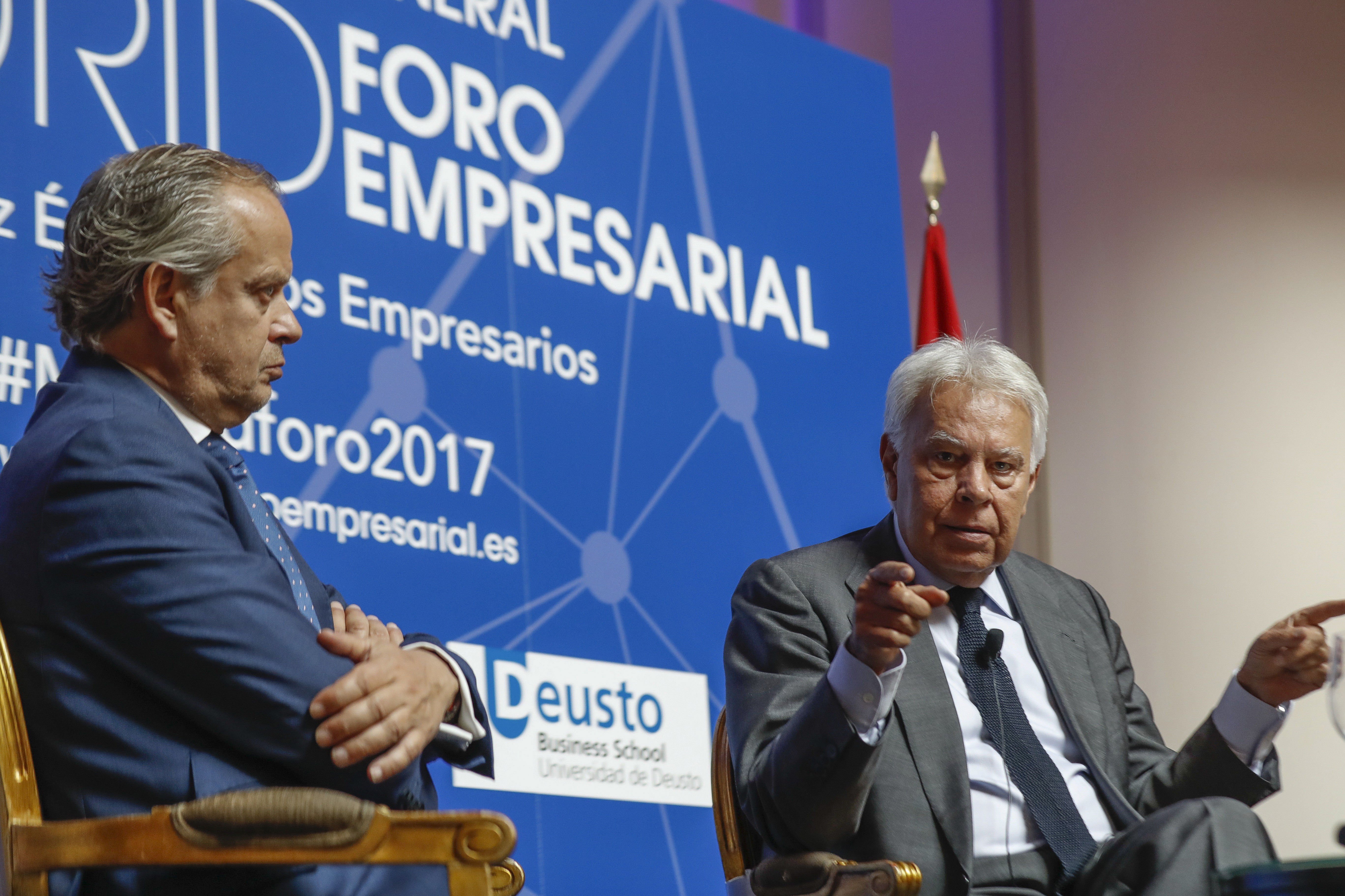Felipe González was prime minister of Spain from 1982 to 1996 for the PSOE (Spanish Socialist Workers' Party). He has today admitted that he is "very, very" worried by situation in Catalonia, to the extent that this is topic that has worried him the most "in the last forty years", although he showed himself to be convinced that it can be solved "between democrats". The former prime minister gave this brief statement arriving at a business forum in Madrid, which also involved other political leaders like Albert Ruiz-Gallardón.
"I have nothing to day, I want to say nothing; I'll say something in here, but little", he said initially to the media waiting for him at the entrance. Despite that, when asked if he was worried by the situation in Catalonia, González said it worried him "a lot". "It's what has worried me most in the last forty years", he said. Asked whether he saw a solution to the Catalan crisis, he said "among democrats, yes".
Later, during his speech to the 2nd General Assembly of the Madrid Business Forum (Madrid Foro Empresarial), he compared Nicolás Maduro's Venezuelan regime to the Catalan independence challenge and asked Catalan authorities to "please" return to the law and put an end to this "dangerous adventure" which has generated "a dramatic state crisis".
Criticism of Rajoy
González also had a comment for Mariano Rajoy's current Spanish government who he asked to "fulfil their obligation". According to the former prime minister, he wouldn't have used the penal option nor the legal-institutional option. He, instead, would have gone for the political option and for the tools offered him by the Constitution, referring to article 155, which gives the central government broad powers over rebellious autonomous communities. "I don't like to do politics sheltering under the [judges'] togas," he said.
"You're resurrecting Franco"
González was especially tough on independence supporters and those who, like ERC (Catalan Republican Left) deputy Gabriel Rufián say that on 1st October they will "bury Franco", and accused them of stirring up "the two Spains". "You've resurrecting Franco," he said. The "two Spains" is a recurring idea in Spanish thought, referring to the divisions that led to, among other things, the Spanish Civil War. The split falls, at least historically, along three lines: political left/right, Anti-clericalism/Catholic Integralism and regional nationalisms/centralism.
As such, he insisted on begging them to "rectify" and return to the law so that they can regain legitimacy. "Return to the law of the Statute [of Autonomy of Catalonia] and the [Spanish] Constitution, in this order, and, from there we'll talk." He notably switched to Catalan for the words "we'll talk": parlarem.
Felipe González señala que habría usado el artículo 155 para frenar el referéndum independentista en Cataluña https://t.co/aDKg2xw7HM pic.twitter.com/bfxcvapX6r
— Europa Press (@europapress) 26 de setembre de 2017
He also referred to the possibility of having to reform the Constitution, something which he has no objection to, although he considers that the current version stands up to comparison with any other "Magna Carta" of the world.
"I was always a crappy reformist"
"You have to respect the law even to change it," he insisted, saying that ignoring the law is to return "to the jungle". "I was always a crappy reformist, not a revolutionary", he admitted between laughs, before warning that, nonetheless, "one thing is to reform and another is to 'centrifuge'" and break cohesion.
The former prime minister lingered over events in Catalonia, which he said "are very similar" to the situation in Venezuela, where Maduro's party lost the elections to the Assembly, Venezuela's legislature and "invented" another National Constituent Assembly (ANC). "Not to be confused with another ANC", he joked, referring to the Catalan National Assembly, which has the same initialism.
Without going through universal suffrage, "they decide to create an initial legitimacy to set the destiny of their country against the constitution that they themselves" had "approved", he said, speaking of Venezuela and the Catalan independence movement.
He also warned that the situation in Venezuela is not being recovered with simple calls for dialogue, because "dialogue remains empty of content when it doesn't lead to a pact and reconciliation, when you don't really negotiate".
Protection for Joan Manuel Serrat
He also asked for "protection" from the Spanish government for his "friend", Joan Manuel Serrat, a Catalan singer-songwriter. Serrat has been highly criticised, especially on social media, for questioning the 1st October referendum.
"I doesn't worry me as much that they insult him on social networks, what worries me is that their political representatives as citizens don't come out to defend him as a citizen", he said, to applause from the forum's attendees.
Later, in front of the audience, which included politicians like Alberto Ruiz-Gallardón, Pablo Casado and Joaquín Leguina, he confessed that he sometimes doesn't express his own opinions to avoid creating more confusion and because, sometimes, he feels "quite alone and swimming against the current".
Almost at the end of his speech, he said he trusts that Rajoy "will give good advice" to Donald Trump in their meeting today in the White House, "if he doesn't receive any". "If he has to receive good advice from Trump, may heaven help us," he said.

